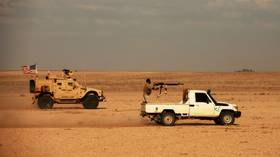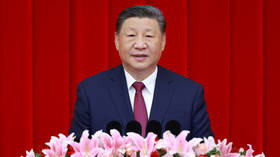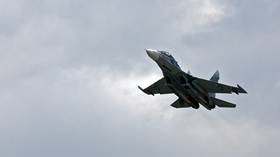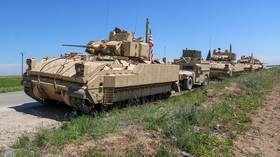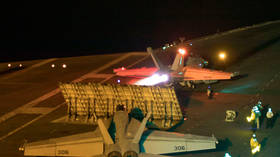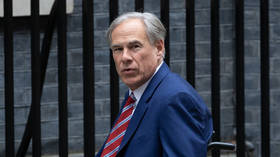Pentagon chief promises Arab allies it will counter Iran
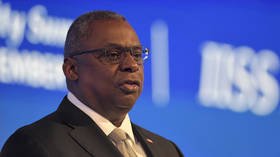
Iran and its drones are a threat to US troops and allies in the Middle East, and Washington will work to deter it, the Pentagon chief told Gulf officials amid concerns that US forces are being realigned away from the region.
“Iran’s proliferation of one-way attack UAVs is a constant threat to American troops and a hindrance in the fight against ISIS,” US Defense Secretary Lloyd Austin said during a regional security conference in Bahrain on Saturday.
“Such systems are likely to feature prominently in the conflicts of the future and they already threaten civilian aircraft. That’s why my department has made it a priority to address the drone threat,” the US official added.
At the Manama Dialogue conference, Lloyd highlighted the Biden administration’s preference for diplomacy over military action, but said the Pentagon was ready to deploy an overwhelming force and secure victory in any part of the world, should it be called to do so.
“We remain committed to a diplomatic outcome of the nuclear issue… If Iran isn’t willing to engage seriously, then we will look at all the options necessary to keep the US secure,” he warned, referring to continued indirect negotiations between the US and Iran in Vienna.
Austin called on Tehran to demonstrate its commitment to renewing the 2015 international agreement on its nuclear program, from which the US withdrew under President Donald Trump. The Biden administration says it wants to revive the deal, but the two sides disagree about how this should be done. He also reiterated Washington’s determination to prevent Iran from obtaining a nuclear weapon, an ambition that the Iranian government denies.
Describing the purported Iranian military threat, the Pentagon chief didn’t identify any specific incidents. But the speech came weeks after an attack on a military base that the US established in eastern Syria, which was attributed by some media to Iranians.
Five so-called ‘kamikaze drones’ reportedly hit the Al-Tanf base close to the Syrian junction point with Iraq and Jordan on October 20. The attack left no casualties, since US troops were evacuated hours before it happened. Tehran never claimed responsibility for the incident and Washington never officially accused Iran of being behind it.
According to US and Israeli sources cited by the New York Times on Friday, the attack was launched by an Iranian proxy force in retaliation for Israeli attacks against Iran-linked groups on Syrian soil.
Austin was visiting Bahrain to reassure US partners in the Middle East of its commitment to their defense. Concerns over dwindling US attention in the region flared up in the wake of the withdrawal from Afghanistan in September. Austin said support from regional partners allowed the US to conduct the massive evacuation of people from Kabul.
Like this story? Share it with a friend!
